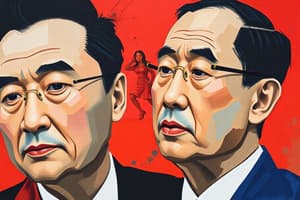Podcast
Questions and Answers
What event in February 1848 in France led to the establishment of a republic?
What event in February 1848 in France led to the establishment of a republic?
The abdication of the monarch.
How did the liberal middle classes in Europe respond to the unrest in the 1840s?
How did the liberal middle classes in Europe respond to the unrest in the 1840s?
They combined demands for constitutionalism with national unification.
What were the key freedoms the liberal middle classes sought for a nation-state?
What were the key freedoms the liberal middle classes sought for a nation-state?
A constitution, freedom of the press, and freedom of association.
Who expressed traditional views on gender roles in the context of the Frankfurt Parliament?
Who expressed traditional views on gender roles in the context of the Frankfurt Parliament?
According to Carl Welcker, what roles were assigned to men and women?
According to Carl Welcker, what roles were assigned to men and women?
What distinguishes modern nations from the political entities of the mid-eighteenth century?
What distinguishes modern nations from the political entities of the mid-eighteenth century?
How did Eric Hobsbawm characterize the existence of modern nations?
How did Eric Hobsbawm characterize the existence of modern nations?
What was the role of wars and revolutions in the formation of modern nationalism?
What was the role of wars and revolutions in the formation of modern nationalism?
In what ways did nationalism in colonial India differ from nationalism in Europe?
In what ways did nationalism in colonial India differ from nationalism in Europe?
Besides prominent leaders, what other elements are important in understanding nationalism?
Besides prominent leaders, what other elements are important in understanding nationalism?
What is the significance of considering small events in the study of nationalism?
What is the significance of considering small events in the study of nationalism?
Why is it important to understand the ideological battles associated with nationalism?
Why is it important to understand the ideological battles associated with nationalism?
What changes occurred in people's perception of nationality from the mid-eighteenth century to the modern era?
What changes occurred in people's perception of nationality from the mid-eighteenth century to the modern era?
What characterized landholding in Eastern and Central Europe compared to the West?
What characterized landholding in Eastern and Central Europe compared to the West?
What social changes accompanied industrialization in Western Europe?
What social changes accompanied industrialization in Western Europe?
How did liberal nationalism relate to liberalism in the early-nineteenth-century Europe?
How did liberal nationalism relate to liberalism in the early-nineteenth-century Europe?
What were the main political aspirations of the liberal middle classes in the nineteenth century?
What were the main political aspirations of the liberal middle classes in the nineteenth century?
What was the stance of nineteenth-century liberals regarding private property?
What was the stance of nineteenth-century liberals regarding private property?
Why was universal suffrage not a goal for early liberals?
Why was universal suffrage not a goal for early liberals?
Describe the impact of the French Revolution on the concept of liberalism.
Describe the impact of the French Revolution on the concept of liberalism.
What role did the educated, liberal middle class play in late nineteenth-century Europe?
What role did the educated, liberal middle class play in late nineteenth-century Europe?
How did the creation of a network of railways impact national unification in Europe?
How did the creation of a network of railways impact national unification in Europe?
What was the primary belief of conservatives after the defeat of Napoleon in 1815?
What was the primary belief of conservatives after the defeat of Napoleon in 1815?
In what way did conservatives view modernization after 1815?
In what way did conservatives view modernization after 1815?
What significant event took place in 1815 involving European powers, and where was it held?
What significant event took place in 1815 involving European powers, and where was it held?
What political philosophy emphasizes gradual development over quick change?
What political philosophy emphasizes gradual development over quick change?
What did most conservatives not propose after the defeat of Napoleon?
What did most conservatives not propose after the defeat of Napoleon?
Which institutions did conservatives prioritize for preservation?
Which institutions did conservatives prioritize for preservation?
How did conservatives believe a modern army and bureaucracy could reinforce autocratic monarchies?
How did conservatives believe a modern army and bureaucracy could reinforce autocratic monarchies?
What was the political condition of Italy before unification in the 19th century?
What was the political condition of Italy before unification in the 19th century?
How did Giuseppe Mazzini contribute to the movement for Italian unity?
How did Giuseppe Mazzini contribute to the movement for Italian unity?
What role did King Victor Emmanuel II play in the unification of Italy?
What role did King Victor Emmanuel II play in the unification of Italy?
Explain the significance of the failures of the revolutionary uprisings in 1831 and 1848 for Italian unification.
Explain the significance of the failures of the revolutionary uprisings in 1831 and 1848 for Italian unification.
What was the impact of foreign domination on Italy's political landscape in the 19th century?
What was the impact of foreign domination on Italy's political landscape in the 19th century?
Why was the Italian language considered fragmented during this period?
Why was the Italian language considered fragmented during this period?
What economic opportunities did the unification of Italy offer to its ruling elites?
What economic opportunities did the unification of Italy offer to its ruling elites?
In what ways did the establishment of the Young Italy society influence Italian nationalism?
In what ways did the establishment of the Young Italy society influence Italian nationalism?
Flashcards are hidden until you start studying
Study Notes
Nations, Countries and Nationalism
- The modern nation is a relatively new concept. Early nations weren't unified entities with specific borders and national languages.
- Nations emerged in Europe around the 18th century, formed through political battles, revolutions, and wars.
- The idea of belonging to a nation developed over decades and was influenced by various political and social contexts.
The Role of Liberal Nationalism
- Liberal nationalism emerged in early-nineteenth-century Europe and was linked to the ideology of liberalism.
- Liberals advocated for individual freedom, equality before the law, and government by consent.
- They were opposed to autocracy, clerical privileges, and sought to create a nation-state modeled on parliamentary principles.
- Liberal nationalism was also associated with economic change and industrial development.
- The rise of the middle class and the growth of a working class further nurtured these ideals.
The Rise of Conservatism
- Following the defeat of Napoleon in 1815, European governments adopted a more conservative approach.
- Conservatism emphasized the importance of tradition, established institutions, and gradual change.
- Conservatives believed the existing social order, including monarchy and the Church, should be maintained for stability.
The Vienna Congress
- In 1815, prominent European powers like Britain, Russia, Prussia, and Austria met at the Congress of Vienna to re-establish order and stability in Europe.
- The Congress, hosted by the Austrian Chancellor Duke Metternich, aimed to establish a balance of power and prevent future conflicts.
The Rise of Unification Movements
- The revolutionary events of February 1848 in France (abdication of the monarch and establishment of a republic based on universal male suffrage) inspired liberals across Europe.
- In areas like Germany, Italy, Poland, and the Austro-Hungarian Empire, liberals pushed for national unification and the creation of nation-states on parliamentary principles.
Italy's Unification
- Like Germany, Italy was politically fragmented during the mid-19th century, divided into seven states with varying rulers, including the Austrian Habsburgs, the Pope and the Bourbon kings of Spain.
- This period also saw the growth of Italian nationalism. Leaders like Giuseppe Mazzini emerged, advocating for a unified Italian Republic.
- Early attempts at unification through revolutionary uprisings in 1831 and 1848 failed.
- Ultimately, Sardinia-Piedmont under King Victor Emmanuel II took the lead in unifying Italy through war.
The Impact of Nationalism
- Nationalism played a crucial role in shaping the political landscape of Europe in the 19th century.
- This new sense of national identity led to both unification and conflict.
- The rise of nationalism was a complex process driven by social, economic, and political factors.
- The unification of Germany and Italy demonstrated both the power of nationalism and the challenges of creating a new sense of shared identity.
- The concept of nationalism continues to be debated, with both positive and negative implications for societies around the world.
Studying That Suits You
Use AI to generate personalized quizzes and flashcards to suit your learning preferences.




